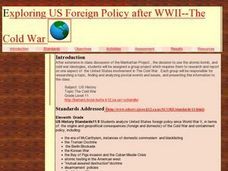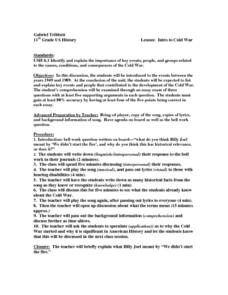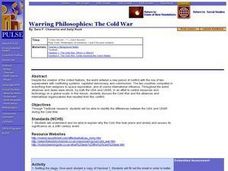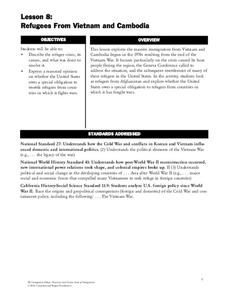University of California
Roots of the Cold War
When and how did the Cold War begin? To answer this question, you will not find a better-organized, in-depth, activity- and inquiry-based resource than this! Executing best teaching practices throughout, each portion of this inquiry...
Curated OER
Exploring US Foreign Policy after WWII--The Cold War
Scholars explore U.S. Foreign Policy and Cold War ideologies adopted after WWII. They conduct Internet research on a topic or issue related to the Cold War Era, watch two films, and compose a time line and a multimedia presentation to...
Curated OER
Cold War
Eleventh graders analyze U.S. foreign policy since World War II, tracing origins and geopolitical consequences (foreign and domestic) of the Cold War and containment policy.
Curated OER
Intro to Cold War
Eleventh graders are introduced to the events between the years 1949 and 1989. They list and explain key events and people that contributed to the development of the Cold War. Students are asked "what do you think Billy Joel meant by...
John F. Kennedy Presidential Library & Museum
Military Advisers in Vietnam: 1963
How did the beginning of the Vietnam War factor into the Cold War with the Soviet Union? As part of a study of American involvement in Vietnam, class members read a letter address to President Kennedy and his response in which...
University of California
Principles vs. Practices
Have you ever wondered what your own World Order would look like? Scholars use primary and secondary documents as well as video clips to investigate and analyze the Cold War. Using the sources, the principles and practices of nations...
University of California
Decolonization
The ripple effect from one small event can impact many others. Young historians research the ripple effect World War II had on decolonization in the second installment of an eight-part series. Through primary and secondary documents as...
Curated OER
Who Was Responsible for the Start of the Cold War?
Students determine who is responsible for the start of the Cold War. In this Cold War lesson, students conduct their own research about the evolution of the war and write essays that reveal their opinion on how the war began.
Curated OER
A Timeline of Cold War Events
Students create a timeline of the major events of the Cold War and explain their effect on Canada. They utilize a worksheet and a website imbedded in this plan which guide their research and presentations.
Curated OER
Cold War Wars
In this Cold War worksheet, students respond to short answer questions regarding the Cuban Missile Crisis, the Vietnam War, the Korean War, and the Chinese Civil War. There are 5 short answer questions regarding each of the conflicts.
Curated OER
The End of WWII and The Beginning of the Cold War
In this end of World War II and Cold War study guide worksheet, learners fill in 44 blanks in a passage with the appropriate words to complete the sentences regarding the time period.
Curated OER
The Cold War
In this Cold War study guide worksheet, students respond to 20 short answer questions. The questions correlate to assigned readings in a textbook.
Curated OER
End of World War II and the Beginning of the Cold War
In this end of World War II and Cold War study guide worksheet, students fill in the blanks in a 6-paragraph passage with the appropriate words to complete the sentences regarding the time period.
Curated OER
Cold War Wars
In this Cold War worksheet, students respond to 21 short answer questions regarding the Cuban Missile Crisis, the Vietnam War, the Korean War, and the Chinese Civil War.
Curated OER
Cold War
In this Cold War study guide worksheet, respond to 5 questions that require them to fill in the blanks with the appropriate words to complete the sentences regarding the conflict.
Curated OER
Warring Philosophies: The Cold War
High schoolers explain why the Cold War took place and ended. They analyze its significance as a 29th century event. Students identify the differences between the USA and USSR during the Cold War.
Curated OER
Intro to the Cold War
Eleventh graders examine the Cold War. In this American History lesson, 11th graders develop answers to comprehension questions about the song "We Didn't Start the Fire". Students write a persuasive essay at the end of the...
Curated OER
Astronomy and the Cold War: How the United States Used the Moon to Target the Soviet Union
Students examine how astronomical observations were used to help target sites in the Soviet Union during Cold War and why such targeting was needed. Students then make predictions and observations of same astronomical events for their...
Curated OER
The End of the Cold War
In this end of the Cold War study guide worksheet, students read a brief overview pertaining to the time period in world history and then respond to 4 reflection questions.
Constitutional Rights Foundation
Refugees From Vietnam and Cambodia
The United States may have pulled its troops from the Vietnam War in 1973, but the conflict was far from over for the citizens living in Asia at the time. An informative resource lets learners know about the wave of over 220,000...
Curated OER
American Foreign Policy Since World War II (The Cold War)
Students identify and interpret some key figures and major events during the Cold War era, including the Korean War, Vietnam, Cuban Missile Crisis, Bay of Pigs Invasion, and the United States and China Cold War Relations. They also play...
University of California
Hot Spots Research Project
The Cold War was only between the US and the USSR, right? Wrong! Scholars use primary and secondary resources to analyze the global impact of the Cold War. The fourth installment of an eight-part series culminates in the creation of a...
Curated OER
Decoding US Foreign Policy: The Iran-Contra Affair
This is a really good lesson. Learners explore US Foreign Policy, the Reagan Administration, and the Iran-Contra Affair through various documents and readers theater. Worksheets, script, and web links are all included. Teaching can't get...
Curated OER
1960 America: Foreign Policy
The 1960's marked shifts in American culture, politics, and policy. Your class groups up to research a series of primary source documents resulting in a timeline and a 15 minute oral presentation. Active learning all the way.



